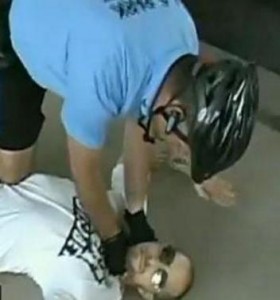 Happy June, HeadCounters! Have you heard how the Supreme Court ruled that cops can enter homes without search warrants in marijuana busts? Or that multiple people were assaulted and arrested by police in Washington, D.C. for… dancing? Well read on. There’s that and more in this month’s Personal Liberty update.
Happy June, HeadCounters! Have you heard how the Supreme Court ruled that cops can enter homes without search warrants in marijuana busts? Or that multiple people were assaulted and arrested by police in Washington, D.C. for… dancing? Well read on. There’s that and more in this month’s Personal Liberty update.
- After a federal court ruling banned dancing at national monuments, five activists arrived to the Jefferson Memorial in Washington, D.C. to dance in protest. As this video shows, they were quickly body-slammed, choked, and arrested by U.S. Park Police, simply for getting down near the monuments. The video has been viewed on YouTube nearly one million times, signaling shock at both the police tactics and the notion that dancing has been banned at national monuments dedicated to reminding us how free we are. For more on this story, I posted a piece on the HeadCount blog.
- Congressman Ron Paul (R-TX), a hero for many Libertarians as well as Tea Party Republicans, has officially announced his candidacy for President. Recently, Congressman Paul criticized members of Congress for supporting raising the nation's debt-ceiling. Both the White House and Treasury Secretary Timothy Geithner have been warned that without raising the debt limit by August 2, there could be catastrophic economic effects. Paul called these warnings little more than fear mongering.
- Another Republican with views similar to congressman Paul has also thrown his hat into the Presidential race, and he's even had the endorsement of Willie Nelson (who strangely later rescinded his endorsement and declared his support for Dennis Kucinich, who isn't even running for President at this time!). Gary Johnson, the former Governor of New Mexico, has long advocated in favor of personal liberty issues like ending the war on drugs and balancing the budget.
- In a landmark ruling in May, the Supreme Court ruled that law enforcement officials no longer need a search warrant to enter and search our homes if they claim to smell marijuana and hear noises that could be the destroying of evidence (like a toilet flushing). The decision in Kentucky v. King overturned a Kentucky Supreme Court ruling in favor of a Kentucky man who was arrested when police entered his apartment and found drugs. While the ruling is definitely not in the best intentions of the Fourth Amendment, Scott Morgan from Flex Your Rights explains why it's also not the death of it here.
- Speaking of the right to be protected against unreasonable searches and seizures, Florida has passed a law requiring all welfare recipients to pass a drug test before receiving any government assistance. A Michigan court ruled a similar law unconstitutional in 2003, arguing that the law would set a dangerous precedent on matters involving the fourth amendment. Governor Rick Scott - whose wife owns a company that specializes in drug testing - says “While there are certainly legitimate needs for public assistance, it is unfair for Florida taxpayers to subsidize drug addiction.” The ACLU has publicly criticized this law while many Floridians have voiced their support for the bill.
- Now let's look at some other interesting issues regarding marijuana policy. In May, Delaware became the 16th state in the union to legalize marijuana for medicinal use. Interestingly enough, that bill was signed into law just after the Federal government sent letters to Governors in 6 states that have medical marijuana laws, threatening federal prosecutions for those following state laws for growing, possessing or distributing medical marijuana. These letters come in stark contrast to the promises made by President Obama during his presidential campaign and also to a memo issued in 2009 by Attorney General Eric Holder specifically stating that federal resources would not be used to prosecute those following state medical marijuana laws.
Well that's this month's update and I hope you enjoyed it. If you see anything on the Web that you think merits mention in the next issue update, be sure to let us know.